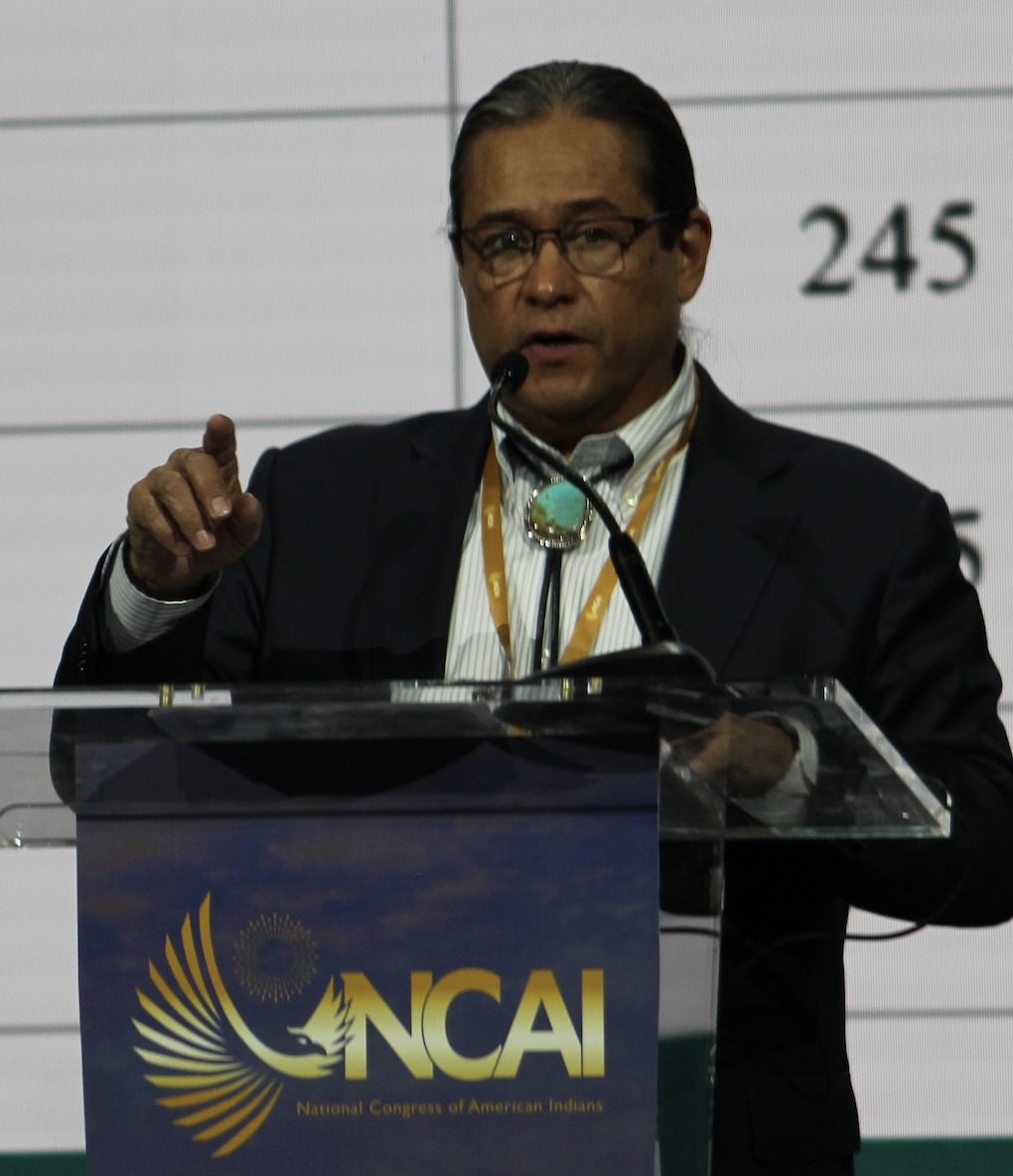
- Details
- By Levi Rickert
WASHINGTON — Hundreds of tribal leaders from throughout Indian Country are in the nation's capital to attend the National Congress of American Indians (NCAI) Executive Council Winter Session. The session will held at the Washington Westin from Monday, February 12 - Thursday, February 15.
This four-day legislative conference will gather leaders of tribal nations to engage in crucial discussions on issues impacting American Indian and Alaska Native communities. The conference features a variety of task force meetings, breakout sessions, special events, and guest speakers from the Biden-Harris administration, Congress, and federal partners. Additionally, winter session will feature the 2024 Native Youth Leadership Summit (NYLS), hosted by the NCAI Youth Commission.
On Monday morning, Mark Macarro (Pechanga) who was elected NCAI president in November 2023 in New Orleans will deliver his first State of Indian Nations address before a live audience at the Warner Theater, located at 513 - 13th Street. In addition to his NCAI role, Macarro has served as tribal chairman of the Pechanga Band of Luiseño Indians located in Temecula California,
Similar to the U.S. president’s annual State of the Union address, each year, the president of NCAI delivers a speech to tribal leaders, members of Congress, government officials, and the public. The purpose of the address is to provide an update on the issues important to Indian Country and a vision for the upcoming year.
Macarro will outline the goals of tribal leaders, the opportunities for success and advancement of Native peoples, and priorities to advance our nation-to-nation relationship with the United States. The event will also be live-streamed on NCAI’s official YouTube channel.
Rep. Mary Peltola (D-Alaska), the first Alaaks Native elected to Congress, will deliver the congressional response at the conclusion of Macarro's address.
On Monday afternoon, there will be several workshops and sessions at the Westin Hotel.
The first general session will begin on Tuesday, February 13.
Late last week, NCAI released the names of the features speakers who will address the general assembly throughout the winter session. (See AGENDA).
Featured speakers include:
-
Deb Haaland, Secretary, U.S. Department of the Interior
-
Denis McDonough, Secretary, U.S. Department of Veterans Affairs
-
Gina Raimondo, Secretary, U.S. Department of Commerce
-
Miguel Cardona, Secretary, U.S. Department of Education
-
Bryan Newland, Assistant Secretary for Indian Affairs, U.S. Department of the Interior
-
Hakeem Jeffries, U.S. House Minority Leader
-
Brian Schatz, Chairman, U.S. Senate Committee on Indian Affairs
-
Frank Pallone, U.S. House Representative
-
Jackson Brossy, Assistant Administrator, Office of Native American Affairs, Small Business Administration
-
Martin O’Malley, Commissioner, Social Security Administration
-
Elizabeth Carr, Tribal Advisor to the Director, Office of Management and Budget
-
Rose Petoskey, Senior Advisor and Tribal Affairs Director, White House Office of Intergovernmental Affairs
-
Elizabeth Reese, Senior Policy Advisor for Native Affairs, White House Domestic Policy Council
More Stories Like This
Native News Weekly (August 25, 2024): D.C. BriefsNavajo Nation Mourns the Passing of Former Vice President Rex Lee Jim
Deb Haaland Earns Endorsement From Communications Workers of America Local 7076
University Soccer Standout Leads by Example
Two Native Americans Named to Democratic Congressional Campaign Committee's“Red to Blue” Program
Help us defend tribal sovereignty.
At Native News Online, our mission is rooted in telling the stories that strengthen sovereignty and uplift Indigenous voices — not just at year’s end, but every single day.
Because of your generosity last year, we were able to keep our reporters on the ground in tribal communities, at national gatherings and in the halls of Congress — covering the issues that matter most to Indian Country: sovereignty, culture, education, health and economic opportunity.
That support sustained us through a tough year in 2025. Now, as we look to the year ahead, we need your help right now to ensure warrior journalism remains strong — reporting that defends tribal sovereignty, amplifies Native truth, and holds power accountable.
 The stakes couldn't be higher. Your support keeps Native voices heard, Native stories told and Native sovereignty defended.
The stakes couldn't be higher. Your support keeps Native voices heard, Native stories told and Native sovereignty defended.
Stand with Warrior Journalism today.
Levi Rickert (Potawatomi), Editor & Publisher


